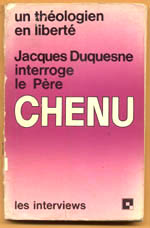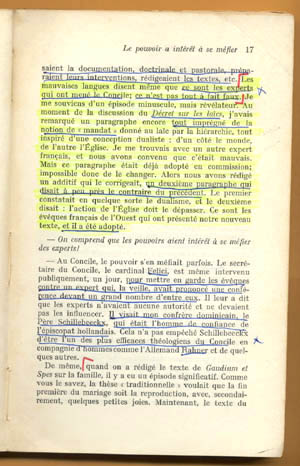Fr. Marie-Dominique Chenu is often considered the main inspirer of the openness to the modern world in the documents of the Second Vatican Council. Some say that he was the expert who wrote Message to the Modern World, an official statement made by the council at its first session. Fr. Chenu also exerted a general influence over the text of Gaudium et spes, the Pastoral Constitution on the Church in the Modern World.
Given that Chenu played this important role, it is significant to read his words on how the theological experts, with no second thoughts, deliberately placed contradictory concepts in the texts of the final documents.
His affirmation is remarkable evidence that should convince Catholics to reject the conciliar documents, which are filled with contradictions and ambiguities. No one is obliged to follow a contradictory teaching.
Top right is a facsimile of the book cover; at right , a photocopy of the French original. Below, we present our translation.
"The gossip is that the experts directed the Council; indeed, this is not so wrong. I recall a minuscule but revealing episode. While the Decree on the Laymen [Apostolicam actuositatem] was being dicussed, I noticed that it still had a paragraph entirely permeated with the notion of a 'mandate' given to laymen by the Hierarchy, inspired by a dualist conception - the Church on one side and the world on the other. I met with another French expert and we agreed that this was bad.
But that paragraph had already been discussed and adopted by the commission. It was impossible, therefore, to change it. So, we wrote a text to be added that corrected it. It was a second paragraph that said more or less the opposite of the preceding one. The first in a certain way affirmed dualism. But the second stated that the action of the Church must go beyond it.
The French Bishops presented our new text as their own, and it was adopted."
(Marie-Dominique Chenu, Jacques Duchesne interroge le Pere Chenu, Paris: Centurion, 1975, p. 17.
|

 |

Posted on July 30, 2005
|
